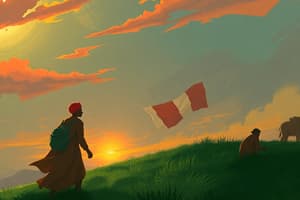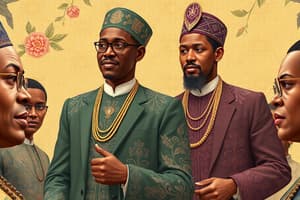Podcast
Questions and Answers
What type of system of government does Nigeria operate?
What type of system of government does Nigeria operate?
- Monarchical
- Parliamentary
- Theocratic
- Presidential (correct)
Which party has been the ruling party in Nigeria since 2015?
Which party has been the ruling party in Nigeria since 2015?
- All Progressives Grand Alliance
- All Progressives Congress (correct)
- Labour Party
- People's Democratic Party
What percentage of Nigeria's foreign exchange earnings come from oil exports?
What percentage of Nigeria's foreign exchange earnings come from oil exports?
- 100%
- 50%
- 75%
- 90% (correct)
What is a major challenge faced by the Nigerian economy?
What is a major challenge faced by the Nigerian economy?
Which terrorist group has been active in Nigeria since 2009?
Which terrorist group has been active in Nigeria since 2009?
What is a major security concern in Nigeria?
What is a major security concern in Nigeria?
What is the name of the operation against Boko Haram?
What is the name of the operation against Boko Haram?
What is the name of the region where clashes between herders and farmers have led to violence and displacement?
What is the name of the region where clashes between herders and farmers have led to violence and displacement?
What is the primary source of foreign exchange earnings in Nigeria?
What is the primary source of foreign exchange earnings in Nigeria?
Which sector employs around 30% of the labor force in Nigeria?
Which sector employs around 30% of the labor force in Nigeria?
What is Nigeria's ranking in terms of oil production globally?
What is Nigeria's ranking in terms of oil production globally?
What is a major challenge facing the Nigerian economy due to its over-reliance on oil exports?
What is a major challenge facing the Nigerian economy due to its over-reliance on oil exports?
What is the main goal of the Economic Recovery and Growth Plan (ERGP) launched in 2017?
What is the main goal of the Economic Recovery and Growth Plan (ERGP) launched in 2017?
What is the name of the agreement signed by Nigeria in 2019 to increase intra-African trade and economic integration?
What is the name of the agreement signed by Nigeria in 2019 to increase intra-African trade and economic integration?
What is a major consequence of the fluctuations in the Nigerian naira against the US dollar?
What is a major consequence of the fluctuations in the Nigerian naira against the US dollar?
What is the ranking of Nigeria's economy in the world?
What is the ranking of Nigeria's economy in the world?
Flashcards are hidden until you start studying
Study Notes
Politics
- Presidential System: Nigeria operates a presidential system of government, with a president serving as both head of state and head of government.
- Ruling Party: The All Progressives Congress (APC) has been the ruling party since 2015, with President Muhammadu Buhari as its leader.
- Opposition Parties: The People's Democratic Party (PDP) is the main opposition party, with other notable parties including the Labour Party and the All Progressives Grand Alliance.
- Elections: Nigeria has a history of controversial elections, with allegations of rigging and violence. The 2019 presidential election was won by President Buhari, but disputed by the opposition.
Economy
- Oil Dependence: Nigeria's economy is heavily reliant on oil exports, which account for approximately 90% of its foreign exchange earnings.
- Diversification Efforts: The government has implemented policies to diversify the economy, including investing in agriculture, mining, and manufacturing.
- Currency Fluctuations: The Nigerian naira has experienced fluctuations in value, affecting the economy and leading to high inflation rates.
- Poverty and Unemployment: Nigeria has significant poverty and unemployment rates, with approximately 40% of the population living below the poverty line.
Security
- Boko Haram Insurgency: The terrorist group Boko Haram has been active in Nigeria since 2009, carrying out attacks and kidnappings, including the abduction of the Chibok schoolgirls in 2014.
- Herder-Farmer Conflicts: Clashes between herders and farmers have led to violence and displacement, particularly in the Middle Belt region.
- Kidnapping for Ransom: Kidnapping for ransom has become a significant security concern, with many high-profile cases in recent years.
- Military Response: The Nigerian military has been involved in various operations to combat insecurity, including Operation Lafiya Dole against Boko Haram.
Politics
- Nigeria operates a presidential system of government, where the president serves as both head of state and head of government.
- The All Progressives Congress (APC) has been the ruling party since 2015, with President Muhammadu Buhari as its leader.
- The People's Democratic Party (PDP) is the main opposition party, alongside other notable parties like the Labour Party and the All Progressives Grand Alliance.
- Nigeria has a history of controversial elections, with allegations of rigging and violence, including the disputed 2019 presidential election.
Economy
- Nigeria's economy is heavily reliant on oil exports, which account for approximately 90% of its foreign exchange earnings.
- The government has implemented policies to diversify the economy, including investing in agriculture, mining, and manufacturing.
- The Nigerian naira has experienced fluctuations in value, leading to high inflation rates.
- Approximately 40% of the population lives below the poverty line, with significant poverty and unemployment rates.
Security
- Boko Haram, a terrorist group, has been active in Nigeria since 2009, carrying out attacks and kidnappings, including the abduction of the Chibok schoolgirls in 2014.
- Clashes between herders and farmers have led to violence and displacement, particularly in the Middle Belt region.
- Kidnapping for ransom has become a significant security concern, with many high-profile cases in recent years.
- The Nigerian military has been involved in various operations to combat insecurity, including Operation Lafiya Dole against Boko Haram.
Economy of Nigeria
Overview
- Nigeria has the largest economy in West Africa and the 27th largest in the world.
Key Sectors
Agriculture
- Employs around 30% of the labor force.
- Major crops include cassava, yams, maize, and rice.
Oil and Gas
- Nigeria is the 12th largest oil producer in the world.
- Oil exports account for a significant portion of government revenue.
Manufacturing
- The sector is relatively small but growing.
- Focus areas include textiles, food processing, and construction materials.
Challenges
- Over-reliance on oil exports makes the economy vulnerable to global oil price fluctuations.
- Inadequate infrastructure, including power outages and poor transportation networks, hinders economic growth.
- Widespread corruption and mismanagement of public funds hinder economic development and discourage foreign investment.
- High levels of unemployment, particularly among youth, contribute to social unrest and instability.
Recent Developments
Economic Recovery and Growth Plan (ERGP)
- Launched in 2017 to diversify the economy, improve infrastructure, and increase non-oil exports.
African Continental Free Trade Area (AfCFTA)
- Nigeria signed the AfCFTA agreement in 2019 to increase intra-African trade and economic integration.
Currency Fluctuations
- The Nigerian naira has experienced significant fluctuations against the US dollar, impacting inflation and economic stability.
Studying That Suits You
Use AI to generate personalized quizzes and flashcards to suit your learning preferences.




